Hua Mulan – Chinese Brave Female Warrior In Disguise Who Fought Instead Of Her Old Father
A. Sutherland - AncientPages.com - The story of Hua Mulan, a brave young female warrior, is related to the Three Kingdoms Period (220–280), a chaotic and difficult time of war and stagnation when China was divided by three robust regimes: Wei, Shu, and Wu.
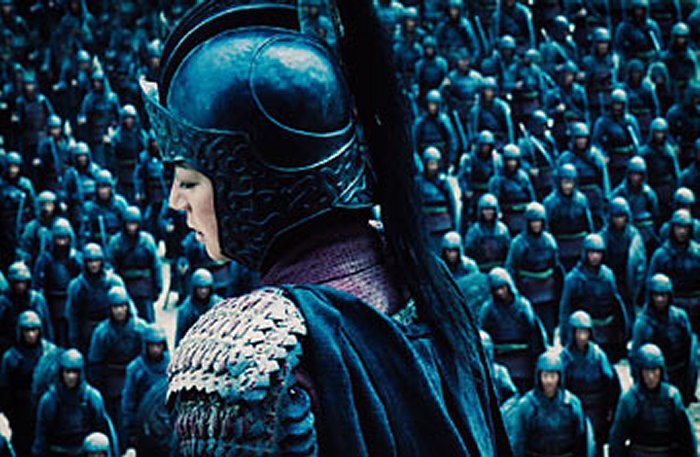 A scene from Hong Kong director Jingle Ma's Mula. Source
A scene from Hong Kong director Jingle Ma's Mula. Source
Still, China's so-called dark Middle Ages was a time full of inspiration for creating beautiful tales, poems, and stories about famous historical figures, heroes, and love.
The Chinese heroine Hua Mulan is one of the oldest and most enduring examples of a woman who becomes a warrior because of her role as a daughter. She was the subject of the “Poem of Mulan,” which undoubtedly inspired other similar Mulan stories, handed down from one generation to another.
Historians have long debated whether she was a real historical figure. In China, however, several variations of the Mulan story have survived for at least 1,500 years. It has been told in Chinese operas, plays, folk tales, and now video games. It is included in Chinese school textbooks and inspired by writers, artists, and storytellers. In 1998, Disney adapted her story for an animated cartoon to great acclaim worldwide.
The “Poem of Mulan” appeared in a twelfth-century poetry anthology compiled by Guo Maoqian (1041 - 1099), who attributes it to an old, sixth-century source that no longer exists.
We must rely on this poem because the available information about her life and deeds is very limited or nonexistent.
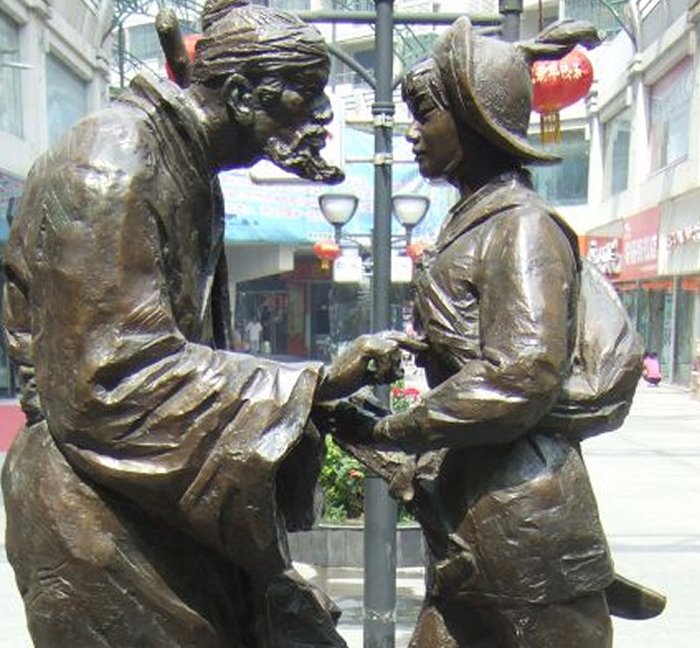 An iron statue of Mulan being welcomed home, in the city of Xinxiang, China. Image credit: Kruuth - -CC BY-SA 3.0
An iron statue of Mulan being welcomed home, in the city of Xinxiang, China. Image credit: Kruuth - -CC BY-SA 3.0
The poem tells of a devoted daughter who entered the battlefield disguised as a man. She defended her elderly father, a brave warrior. The girl changed her clothes and fought on equal terms with men.
In general, this is not just a story about a girl but about traditional Chinese virtues, including loyalty, devotion to parents, courage, and honor.
Mulan (her name 'Mulan' means ‘Magnolia liliiflora,' a small tree native to southwest China) was born in a small village in northern China and probably lived from 581 to 618 AD (or between 386 and 534 AD, according to other versions). Her father was a soldier and raised Mulan like a boy.
She learned weaving and embroidery from her mother but also trained in archery, martial arts, equitation, and fencing with her father. Additionally, she devoted time to reading her father’s manuals on military strategy.
Her father was already very old, but he responded to the emperor's request and was about to go to war. Then, Mulan decided to go instead of his father to the war. She realized that his age and health may not allow him to fight successfully, survive, and return home. Mulan’s brother was too young and had to stay at home.
This painting depicts Mulan. Identified as He Dazi (赫達資) - Selections. The Art and Aesthetics of Form: Selections from the History of Chinese Painting (exhibit). Taipei: National Palace Museum. Public Domain
She purchased a horse, weapons, and armor and disguised herself as a man, as women were excluded from joining the all-male military.
She decided to join the army to fulfill her obligations. With her father's blessings, Mulan left home and fought for more than ten years, and no one realized that a girl was hiding under a man's clothes.
She led the army from one victory to another, and the emperor personally noted the soldier's courage, which inspired his companions and contributed to many battlefield successes. After more than ten years, the enemy was finally defeated, but only the bravest men returned.
Among them were Mulan and her long-time comrades. The emperor learned that the warrior who led his troops was a woman. He met them all and offered them honorary ranks, appointments at court, and rewards. In one later version of the Mulan story, she is even offered the position of emperor’s consort, but she refuses.
Hua Mulan was tired and only wanted a fast horse to take her home. Giving up the awards given by the emperor, the brave female warrior returned home.
Once there, she entered the house and put on a woman’s clothing and makeup. She did not need a disguise anymore.
Written by – A. Sutherland - AncientPages.com Senior Staff Writer
Copyright © AncientPages.com All rights reserved. This material may not be published, broadcast, rewritten or redistributed in whole or part without the express written permission of AncientPages.com
Expand for referencesReferences:
Yi Gang, The Story of Mulan
Shiamin Kwa, Mulan
Toler, Pamela D.. Women Warriors
More From Ancient Pages
-
 Mystery Of The Knights Templar – Secret Mission And Loss Of A Great Treasure – Part 2
Featured Stories | Aug 23, 2019
Mystery Of The Knights Templar – Secret Mission And Loss Of A Great Treasure – Part 2
Featured Stories | Aug 23, 2019 -
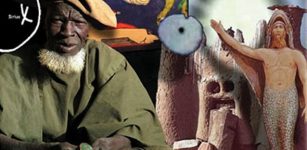 Sirius Mystery – Scientific Evidence Of Alien Contact 5,000 Years Ago – Book Review
Civilizations | Apr 1, 2014
Sirius Mystery – Scientific Evidence Of Alien Contact 5,000 Years Ago – Book Review
Civilizations | Apr 1, 2014 -
 Draugr – Vikings Feared This Ugly Living Dead With Prophetic Visions
Featured Stories | May 24, 2020
Draugr – Vikings Feared This Ugly Living Dead With Prophetic Visions
Featured Stories | May 24, 2020 -
 Huge Viking Burial Discovered Beneath Streets Of Dublin
Archaeology | Aug 6, 2014
Huge Viking Burial Discovered Beneath Streets Of Dublin
Archaeology | Aug 6, 2014 -
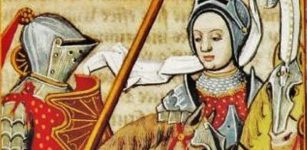 Jeanne de Clisson ‘Lioness Of Bretagne’: Her Black Painted Ships With Red Sails Terrorized English Channel
Featured Stories | Oct 4, 2019
Jeanne de Clisson ‘Lioness Of Bretagne’: Her Black Painted Ships With Red Sails Terrorized English Channel
Featured Stories | Oct 4, 2019 -
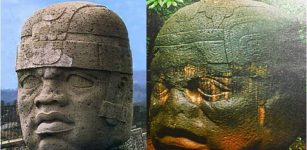 The Olmecs – Who They Were, Where They Came From Still Remains A Mystery
Civilizations | Feb 19, 2015
The Olmecs – Who They Were, Where They Came From Still Remains A Mystery
Civilizations | Feb 19, 2015 -
 Significant Mesolithic Site With Unusual Pits Discovered In Bedfordshire
Archaeology | Jul 3, 2023
Significant Mesolithic Site With Unusual Pits Discovered In Bedfordshire
Archaeology | Jul 3, 2023 -
 Pharaoh Hatshepsut: Skillful And Efficient Female Ruler Who Brought Prosperity To Ancient Egypt
Featured Stories | Mar 22, 2017
Pharaoh Hatshepsut: Skillful And Efficient Female Ruler Who Brought Prosperity To Ancient Egypt
Featured Stories | Mar 22, 2017 -
 Unknown Purpose Of The Mysterious Huge Iron Age Ceramic Sharjah Jar Puzzles Scientists
Archaeology | Oct 7, 2022
Unknown Purpose Of The Mysterious Huge Iron Age Ceramic Sharjah Jar Puzzles Scientists
Archaeology | Oct 7, 2022 -
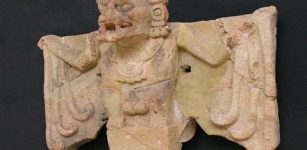 Camazotz: ‘Death Bat’ Vampire God In Ancient Maya Beliefs
Featured Stories | Jun 8, 2017
Camazotz: ‘Death Bat’ Vampire God In Ancient Maya Beliefs
Featured Stories | Jun 8, 2017 -
 Rare Medieval Hall Found Near Norman Castle At Skipsea, UK
Archaeology | May 15, 2024
Rare Medieval Hall Found Near Norman Castle At Skipsea, UK
Archaeology | May 15, 2024 -
 On This Day In History: Gutenberg Prints The First Bible – On Feb 23, 1455
News | Feb 23, 2017
On This Day In History: Gutenberg Prints The First Bible – On Feb 23, 1455
News | Feb 23, 2017 -
 Gobustan’s Petroglyphs And Yalli Dancers’ Amazing Musical Stone
Featured Stories | May 29, 2023
Gobustan’s Petroglyphs And Yalli Dancers’ Amazing Musical Stone
Featured Stories | May 29, 2023 -
 Castlerigg Stone Circle: One Of Britain’s Most Important And Earliest Stone Circles
Featured Stories | Apr 16, 2019
Castlerigg Stone Circle: One Of Britain’s Most Important And Earliest Stone Circles
Featured Stories | Apr 16, 2019 -
 Viking Funeral Traditions: Burning Ships, Complex Ancient Rituals And Incredible Up Helly Aa Festival
Ancient Traditions And Customs | Jan 28, 2017
Viking Funeral Traditions: Burning Ships, Complex Ancient Rituals And Incredible Up Helly Aa Festival
Ancient Traditions And Customs | Jan 28, 2017 -
 Rare Upper Paleolithic Human Remains Discovered In The Iberian Peninsula
Archaeology | Aug 12, 2021
Rare Upper Paleolithic Human Remains Discovered In The Iberian Peninsula
Archaeology | Aug 12, 2021 -
 Enigmatic Newport Tower – Built By The Vikings, Knights Templar, Freemasons Or Someone Else?
Featured Stories | Aug 1, 2024
Enigmatic Newport Tower – Built By The Vikings, Knights Templar, Freemasons Or Someone Else?
Featured Stories | Aug 1, 2024 -
 Discovered: Mysterious 2,400-Year-Old Ancient Egyptian Shrine Belonging To 30th Dynasty Pharaoh Nectanebo I
Archaeology | Oct 6, 2015
Discovered: Mysterious 2,400-Year-Old Ancient Egyptian Shrine Belonging To 30th Dynasty Pharaoh Nectanebo I
Archaeology | Oct 6, 2015 -
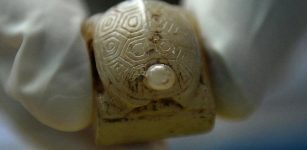 Rich 2,000-Year-Old Chinese Tomb May Reveal Secret Identity Of Its Owner
Archaeology | Dec 18, 2015
Rich 2,000-Year-Old Chinese Tomb May Reveal Secret Identity Of Its Owner
Archaeology | Dec 18, 2015 -
 On This Day In History: Battle of Tsushima Was Fought – On May 27, 1905
News | May 27, 2016
On This Day In History: Battle of Tsushima Was Fought – On May 27, 1905
News | May 27, 2016

